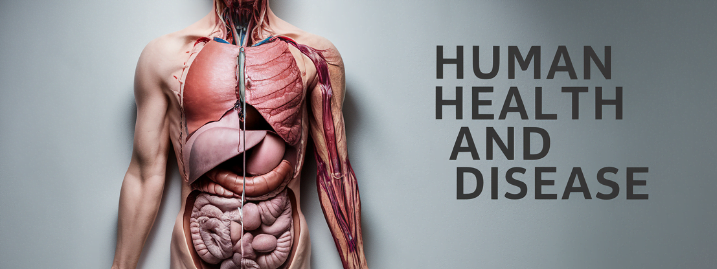
Human Health and Disease MCQ for NEET
Human Health and Disease is an important topic in biology that covers the study of the human body’s well-being and the diseases that can affect it. Health is defined as a state of complete physical, mental and social well-being, not merely the absence of disease or infirmity. Diseases, on the other hand, are conditions that disrupt the normal functioning of the body and can be caused by various factors, including pathogens (like bacteria, viruses, fungi and parasites), genetic abnormalities, nutritional deficiencies and environmental factors.
In this article, we will cover some Multiple choice questions on the topic of Human Health and Disease which is important from the NEET examination.
| NEET 2025 Exam Important Links | |
|---|---|
| NEET 2025 Updated Syllabus | NEET Eligibility Criteria 2025 |
| Biology Preparation | Chemistry NEET Preparation |
| NEET Preparation tips for 2025 | NEET Result 2024 |
MCQs
I. physical fitness
II. presence of disease
III. mental and social well-being
Which of the options given above are correct ?
Hence, option (a) is correct.
Enhance your preparation with Arexiq’s Mock Test Series where we provide solutions to various MCQs like we provide in this post “Human Health and Disease MCQ”. Our expert teachers explain the concepts thoroughly, making it easy for you to understand. We offer many types of questions ensuring a clear grasp of concepts.
FAQ's
- What is health?
Answer. Health is a state of complete physical, mental and social well-being, not just the absence of disease or infirmity.
- What is a disease?
Answer. A disease is any condition that disrupts the normal functioning of the body.
- What are pathogens?
Answer. Pathogens are organisms that cause diseases, including bacteria, viruses, fungi and parasites.
- What is the role of the immune system?
Answer. The immune system protects the body against pathogens and other harmful agents.
- What is vaccination?
Answer. Vaccination is a method of stimulating the immune system to protect against specific diseases by introducing a harmless form of the pathogen.
- What is the difference between infectious and non-infectious diseases?
Answer. Infectious Diseases are caused by pathogens like bacteria, viruses, fungi and parasites. They can be transmitted from one person to another. Non-Infectious Diseases are not caused by pathogens and cannot be transmitted. They include genetic disorders, lifestyle diseases and deficiency diseases.
- How does vaccination help in disease prevention?
Answer. Vaccination introduces a weakened or inactive form of a pathogen into the body, stimulating the immune system to produce antibodies. This helps build immunity against the disease without causing the disease itself.
- What are lifestyle diseases and how can they be prevented?
Answer. Lifestyle diseases, such as diabetes, heart disease and obesity, are primarily caused by unhealthy habits like poor diet, lack of exercise and smoking. They can be prevented by adopting a healthy lifestyle, including a balanced diet, regular physical activity and avoiding harmful substances.
- What role does the immune system play in protecting against diseases?
Answer. The immune system defends the body against harmful pathogens. It includes physical barriers (like the skin), the innate immune system (general defense mechanisms) and the adaptive immune system (specific responses involving B cells and T cells).
- What are some common genetic disorders?
Answer. Common genetic disorders include cystic fibrosis, sickle cell anemia and Down syndrome. These diseases are caused by abnormalities in an individual’s DNA and can be inherited from parents.


